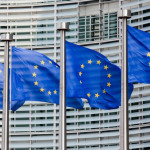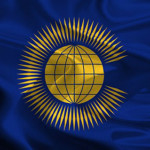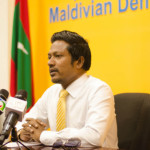The following op-ed was written by Anders Henriksen and Lykke Friss from the University of Copenhagen and first appeared on The Conversation. Republished with permission.
This year has been anything but tranquil in paradise. In March, after a prolonged period of tension in the Maldives – the Indian Ocean island nation better known as a honeymoon paradise – a panel of judges found the former president, Mohamed Nasheed, guilty of terrorism and sentenced him to 13 years imprisonment.
The international community has condemned Nasheed’s trial as a farce. The charges against him were highly dubious, he was denied the right to legal counsel, given just a few days to prepare his defence – and two of the presiding judges even testified on behalf of the prosecution. Amnesty International labelled the trial as “a travesty of justice”.
As numerous UN reports have shown, the Maldivian judiciary is highly corrupt. It is a judiciary that is loyal not to the rule of law, but to the regime that has been in charge since a coup d’état in 2012. Nasheed is now back in the same jail where he spent years as a prisoner of conscience during the former Maldives dictatorship.
Shattered dreams
At the end of 2008, when democracy swept aside 30 years of dictatorship, it all looked so promising. The Maldivian people chose Nasheed as president in their first democratic elections and, for a brief moment, freedom blossomed.
During Nasheed’s presidency, Maldivians could speak freely for the first time, enjoy new found political freedoms, and express themselves through art and culture. Internationally, the charismatic new leader gained fame for his remarkable efforts to persuade the world to combat climate change, which threatens low-lying Maldives. Nasheed toured the world as a political rock-star, receiving accolades from the White House to Windsor Castle.
But it did not take long for the old regime to move against the young democratic government. On February 7 2012, Nasheed was forced to resign and the presidency was handed to Mohamed Waheed, a puppet of the former regime. The Maldivessoon reverted to type: journalists were targeted, protesters beaten up, and opposition politicians threatened and murdered.
The subsequent presidential elections 2013 were marred by widespread allegations of vote-rigging. The former dictator’s half brother, Abdulla Yameen, won – despite an overwhelming expectation that Nasheed would be returned.
Democracy trampled
Nasheed’s incarceration should be cause for concern to anyone who cares about democracy, liberty or the rights of women. In the Maldives, the moderate, freedom-oriented version of Islam that Nasheed espoused is under threat from a regime that colludes with Islamic extremists.
Unless the current trajectory is turned, the liberal forces in the countries will lose the on-going battle with fundamentalist Islam. In the last year alone, Islamic State supporters have rallied in the streets of Male, the Maldivian capital, and a growing number of Maldivians – some with experience of terrorist training camps in Pakistan – have gone to Syria to fight for Islamic State. Only Nasheed and his Maldivian Democratic Party have been willing to tackle the growing problems of Islamic radicalism.
There are few statesmen of Nasheed’s stature. Many foreign journalists, with good reason, refer to him as the “Mandela of the Maldives”. In the interests of democracy and stability, the international community must take a clear stand. Unless Nasheed is swiftly released from prison, the European Union and other nations should impose targeted sanctions against those in power.
These sanctions should include travel bans and foreign asset freezes. The sanctions should target President Yameen, his cabinet ministers, including the minister of tourism, and the corrupt judges who imprisoned Nasheed, and members of the security forces responsible for attacks on peaceful protesters.
Furthermore, since the survival of the regime depends on the annual arrival of the more than a million foreign tourists, individual countries should also supplement sanctions with a tourism boycott. Just like potential tourists should think twice before spending their money on the atolls. Yameen’s regime is baring its teeth. It is time for the international community to respond in kind.
Anders Henriksen is an associate professor of public international law and Lykke Friis is the prorector for education at the University of Copenhagen.
All comment pieces are the sole view of the author and do not reflect the editorial policy of Minivan News. If you would like to write an opinion piece, please send proposals to [email protected]
 (0)Dislikes
(0)Dislikes (0)
(0)






Surely everyone knows that the Maldives has been a family business [Gayoom] for many years now..Only the Maldivian people can bring the Maldives into a Democracy,and this can only be done with fair and honest elections..This present government could signal their intentions to have a fair and just democracy by immediately releasing Nasheed,and calling a new general election...
@Anders Henriksen is an associate professor of public international law and Lykke Friis is the prorector for education at the University of Copenhagen say:
"Many foreign journalists, with good reason, refer to him as the “Mandela of the Maldives”.
Well, many foreign journalists do write about the Maldives in present times because there is a focus of attention here for the mere fact that the words "the Maldives" are considered to be a universally known brand today. People tend to like to get associated with this brand. Many a time in recent times to self promote themselves and therefore, for the wrong reason .
The real Mandelas of the Maldives were the ones who brought in the silent revolution to pull-down the 30-year-old Dictatorship. They shall be considered to be men and women, boys and girls, young and old who wrote and fought and who died, who got lost and till today their names have never been written. But we know them and we will always treasure their works and their lives. The works of historian and freedom writer Old-man-Shafeeg still lives on. Please question Professor Adam of University of Aberdeen or even refer to Thor Heyerdahl the Norwegian adventurer and ethnographer with a background in zoology, botany, and geography about the writer /historian Old-Man-Shafeeg. Old-Man-Shafeeg contributed more than 20 short stories with a political twist to usher support for freedom of speech and expression. He spent solitary confinement in jail at his old age and still struggling due the consequences of that detention.
Just because Nasheed played to the tune of "White House and Windsor Castle" and whine and hum-drummed with the "Alternative Narrative" Speech to make FUN of Islam in Copenhagen both of you are trying to make him Hero-and- Maglo, which he does not deserve.
It was Nasheed's inexperience, immaturity and his virtual and almost total dependency on foreign advice and assistance from India and British PM,that he failed to perform. He resigned on his own accord without even consulting his cabinet. The Truth of the matter and the Fact is that there were riots by then opposition as much as there are riots on Male' streets at nights now mainly orchestrated by malcontents who are pro-Nasheed. The fact that Nasheed locked-up Criminal Court judge without due process is a well known fact by every young and old citizen of the Maldives.
He is not Mandela, He is Nasheed, He is a useless person, still he is trying to be big and he is a failler Please stop this nonecesnce.
Nasheed is Nasheed, Mandela is Mandela. Nonce, Nasheed also a dictator, and person do not have ability of governing a goverment. That was the reason man in Prison.
Mind your English bloody idiot